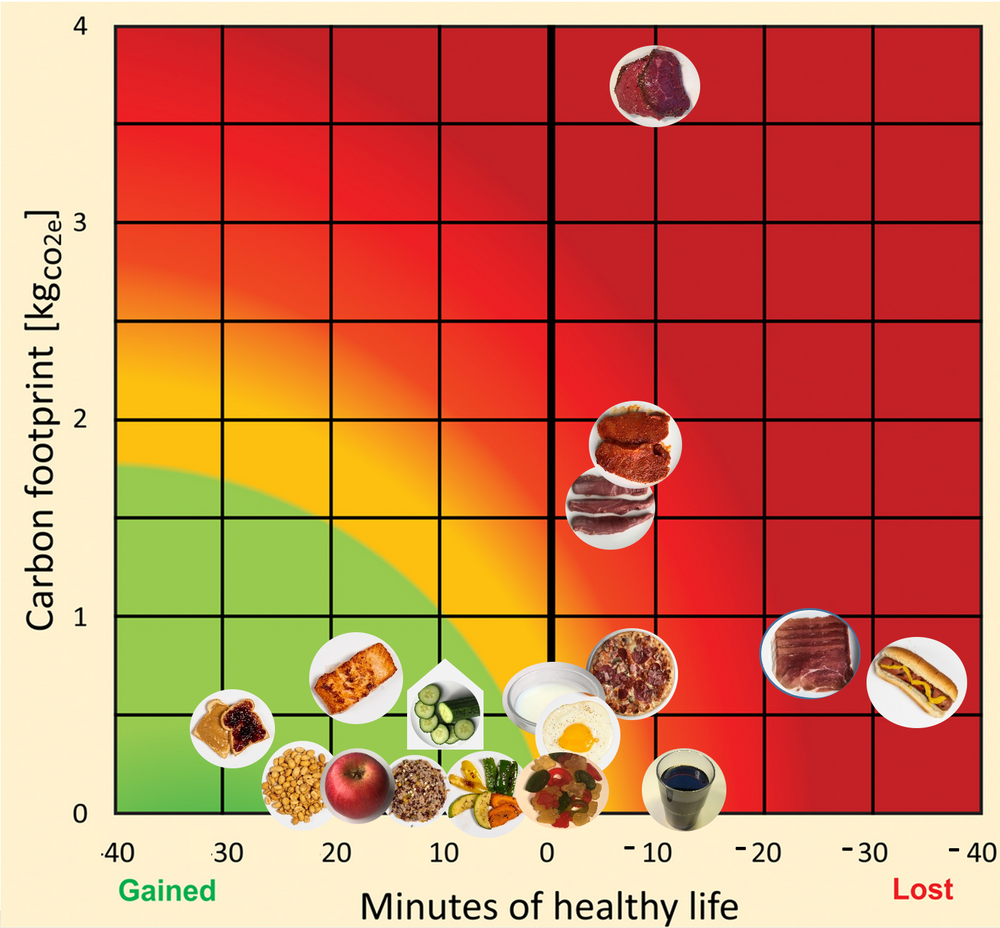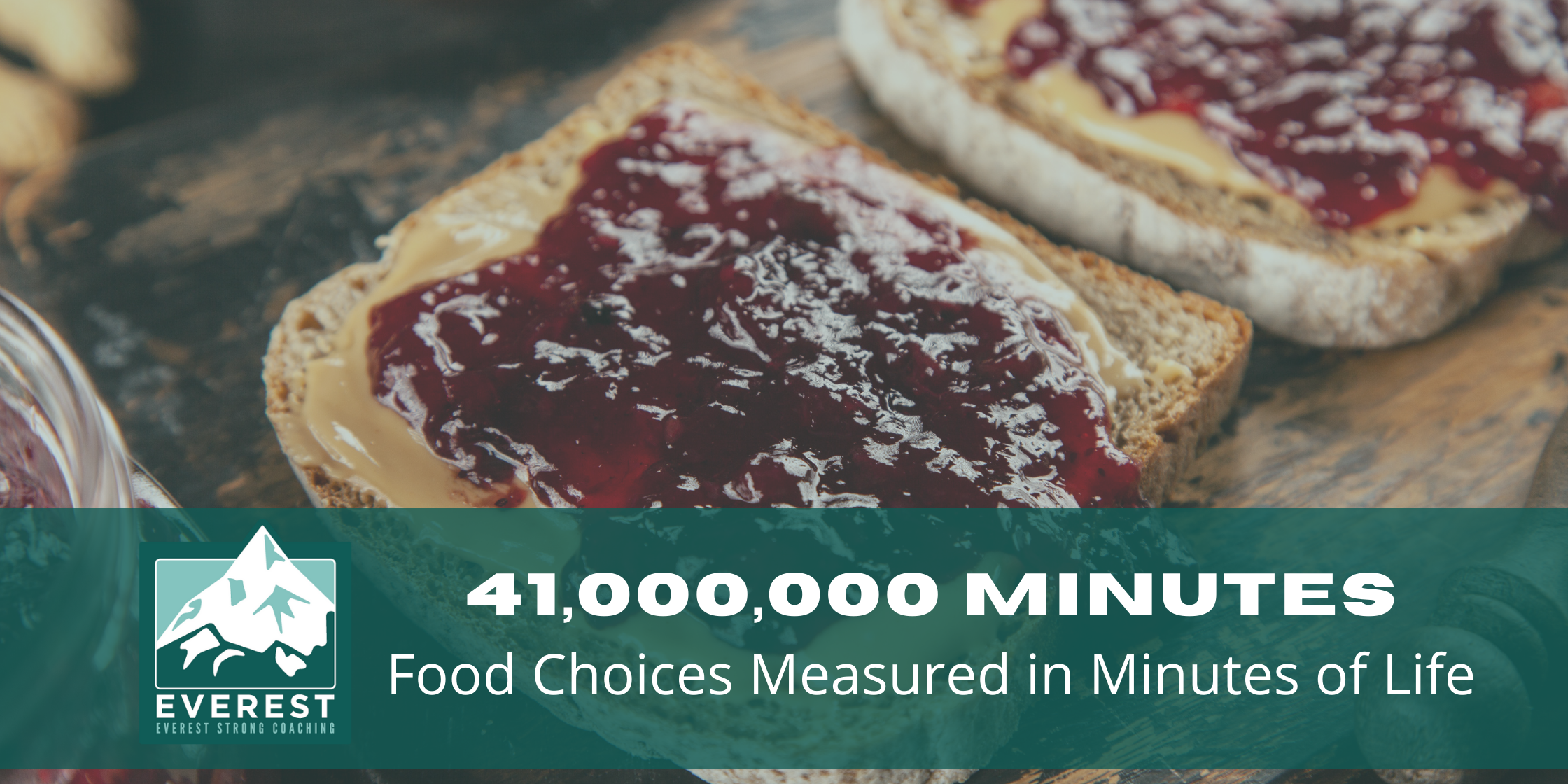41,000,000 minutes makes up the average lifespan in the United States.
This sounds like a lot. With that many minutes you have plenty to spare, right? Breaking it down, there are 525,600 minutes in a year and 1440 in a day. Why do I mention this? Because in August 2021 a nutritional index was released by researchers at the University of Michigan with some shocking information.
They classified foods according to their environmental impact—as in the carbon footprint related to producing said food. More shockingly, the study assigned a health burden, measured in terms of “minutes of a healthy life.” The shocking part, on a personal level, was how many minutes were added or taken from your life, based on what you ate.
One Hotdog Subtracts 36 Minutes of Life
It is not particularly surprising that processed foods, especially processed meats (bacon!) and sugary drinks, were the biggest offenders. Of note, one hot dog would cost you 36 minutes of life, bacon about 25 minutes. Single servings of beef, lamb and pork, can shorten your life by 10 minutes, while also having a bigger negative impact on the environment. In contrast, one serving of nuts, fatty fish, legumes, and field-grown fruits and vegetables (greenhouse grown vegetables fell on the negative side) can add anywhere from 10 to 26 minutes to your life.

Relative positions of select foods, from apples to hot dogs, are shown on a carbon footprint versus nutritional health map. Foods scoring well, shown in green, have beneficial effects on human health and a low environmental footprint. Austin Thomason/Michigan Photography and University of Michigan, CC BY-ND
What Are you Feeding Your Children? (And Yourself?)
Beyond your own diet, this really makes you think twice about what you put on your children’s plates. A study conducted over two decades (Wang et al) found that children and teens in the US are typically getting two-thirds of their calories from ultra-processed foods. This explains the incredible increase in cardiovascular disease, cancers, and diabetes. Parents can help children develop healthier habits by introducing them to healthy eating early on.
Small Changes Make a Difference
Notable in the study, was the good news that small changes, even to 10% of your diet, can make a big impact on your lifelong health and on the environment.
There are many ways to make small substitutions, or to “sneak-in” some of the healthier choices. I like to add chickpeas, onions, mushrooms, and sun-dried tomatoes into my ground beef when making meatballs or burgers. I skip the pasta and buns and instead put the one-third-veggie meatballs over stir-fry and add roasted sweet and white potatoes to complete my burger plate. Salads are a wonderful way to throw a ton of veggies and legumes together and mix-in with a bit of grilled fish or lean meat. And plant-based protein shakes aren’t too terrible either. I like to throw some spinach, apple and banana for that fresh fruit and veggie taste. (Or a fruitier taste to camouflage the veggies for your children!)
Take it a Meal at a Time
While it might seem daunting to incorporate a whole new regime at one time, taking it a step at a time can get you and your family on the path to healthier eating (watch the video below for an easy visual summary). And good news for kids (as long as there are no peanut allergies) one of the highest scoring foods from a minutes gained/good for the environment scale, is a peanut butter and jam sandwich. It’s all about finding balance.
Resources
The Conversation, Individual Dietary Choices Can Add—or Take Away—Minutes, hours, and Years of Life https://theconversation.com/individual-dietary-choices-can-add-or-take-away-minutes-hours-and-years-of-life-166022
Science Daily, Ultraprocessed foods now comprise 2/3 of calories in children and teen diets. https://www.sciencedaily.com/releases/2021/08/210810110955.htm
University of Michigan News, Small Changes in Diet Could Help You Live Healthier, More Sustainably. https://news.umich.edu/small-changes-in-diet-could-help-you-live-healthier-more-sustainably/

